Netflix’s ‘Death by Lightning’ is a historical show that charts the story of U.S. politics in the early 1880s, centering around an unexpected presidential term. The narrative remains twofold, following the peculiar series of events that leads Congressman James Garfield to helm the country’s 20th Presidency. The most unique thing about his election campaign and following term in the White House remains the fact that the politician never actively seeks out the presidential nomination. Yet, once reluctantly saddled with the responsibility, he vows to carry out his term with honor and a staunch anti-corruption agenda. Charles Guiteau, a failed lawyer, helms the narrative from the opposite end. He’s a failed lawyer and an aspiring man of politics, whose fanatic obsession with Garfield and his career eventually spirals out into chaotic disaster. As these two intertwined stories unravel, Garfield and Guiteau find themselves headed down unpredictable roads. SPOILERS AHEAD!
Death by Lightning Recap
In 1880, New York, Charles Guiteau finds himself very narrowly escaping from the grasp of law after his own ill-advised actions as a tenant land him in front of a panel of judges. Fortunately for him, he has his wife, Francis, and her reluctant husband’s hospitality to rely on in the aftermath. Meanwhile, James “Jim” Garfield, a member of the Ohio State Senate, finds himself leaving his family farm for a few days to travel to Washington, DC, and support John Sherman to become the next Republican Presidential Nominee. Both men know the chances of the latter winning against President Ulysses Grant, whom New York Representative Roscoe Conkling backs, remain thin. Still, Sherman wants to at least challenge the party toward potential reform by presenting a challenge to the current President. On the day of the ballot, several men run for the nomination, including one James Blaine.
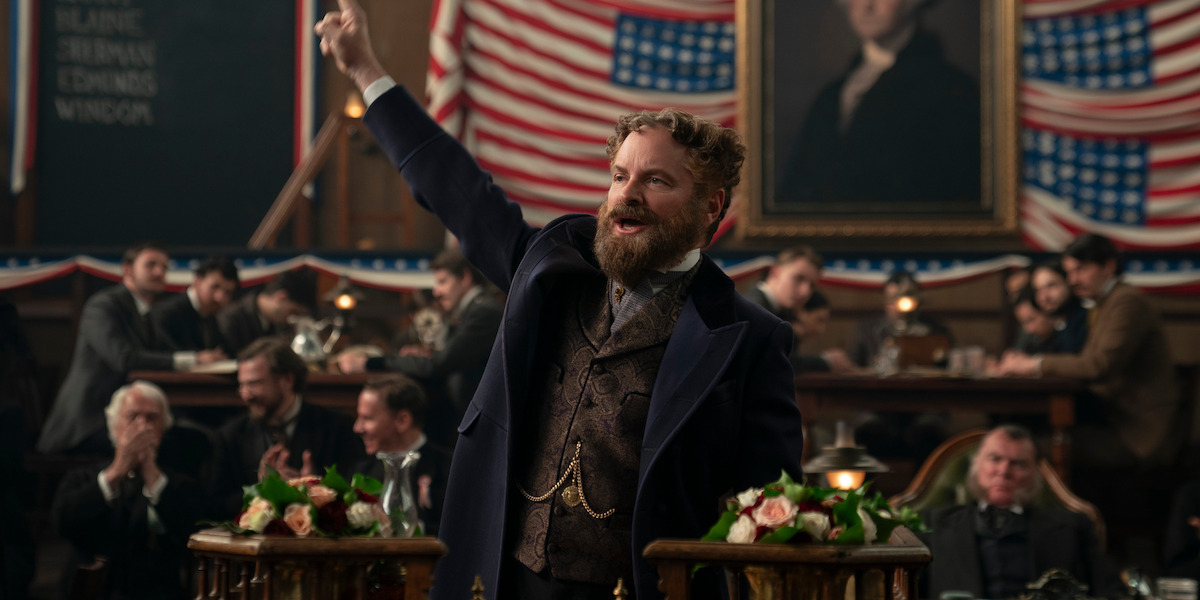
When the time comes, Garfield delivers an impassioned anti-corruption speech about the dire need for reform in the Republican party, nominating his ally as his chosen candidate. Nonetheless, his speech has an unintentional effect when one of the Senators ends up voting for him as the desired Nominee. With most of the votes divided between Grant and Blaine, the party continues voting until a majority can be reached. Surprisingly, with every ballot, Garfield’s popularity grows to the point where Blaine realizes he would have a better chance of beating Grant by putting his weight behind the other man. Consequently, despite the congressman’s protests, he ends up winning the majority vote, becoming the Presidential Nominee for the Republican Party. As all of this is unfolding, Guiteau finds himself at one of the lowest points of his life as his actions compel even his supportive sister to encourage him to seek institutionalized help.
For the same reason, when Guiteau sees Garfield’s unexpected success, it instills a twisted sense of hope in him. Thus, he decides he’s going to help the candidate’s campaign by any means necessary. This mostly involves fortuitously running into Republican Senators and unsuccessfully offering his falsely inflated experience and influence to campaign for Garfield. The real work gets done behind closed doors as Blaine helps the Republicans poach Conkling’s closest ally, Chester Arthur, the Collector of the Port of New York, by offering him the Vice President position. In the end, this helps Garfield win the election, making him the 20th President of the United States. Yet, an uphill battle awaits him. The President is eager to build his cabinet with his selected staff of progressives, including Blaine as his Secretary of State. Nonetheless, the mole in his ranks, Arthur, reports his plans to Conkling, offering him an opportunity to deliver threats to every congressman against accepting the positions.
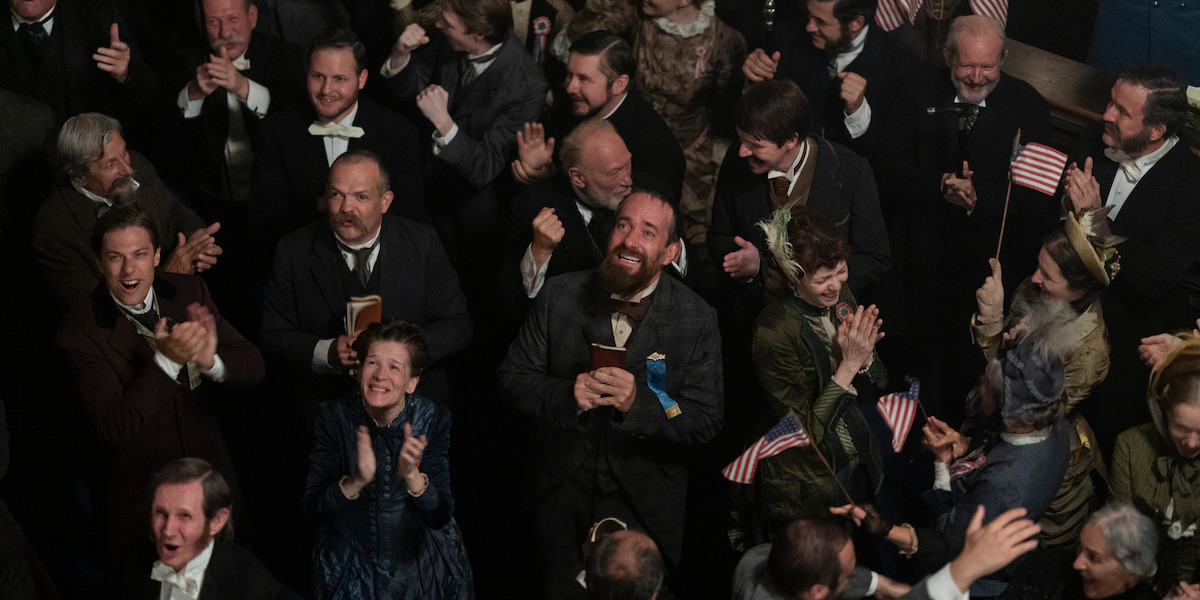
On the other hand, after much toiling, Guiteau finally gets the opportunity to meet with the President during his calling hours. During the meeting, he expresses his admiration for the man, alongside delusional beliefs that Garfield can help him reach similar levels of greatness. When he’s met his disasifying answers, he begins to spiral. After failing to secure another such meeting, he forges letters in the President’s name to convince Blaine to allow him a consulship somewhere. When rebuffed, he takes great offense, steadfast in his belief that he has helped Garfield win the election and is now being robbed of reward. Soon, his delusions grow, compelling him to believe the latter would run the country into the ground. Therefore, he starts to believe God has tasked him with one responsibility: carrying out the assassination of James Garfield.
Death by Lightning Ending: How Does Garfield Die? Could He Have Survived?
James Garfield’s assassination takes place three months into his Presidency at the hands of Charles Guiteau, who was once a frantic supporter of his. The latter deludes himself into believing he is an integral aspect of the politician’s election campaign following his nomination as the Republican candidate. As a result, he consistently attempts to insert himself into rooms with Senators and other important people, vying for opportunities to further his own “career.” He fibs and exaggerates his accomplishments, even going as far as to forge signatures of government officials, including Garfield himself, in order to falsify his own legitimacy. Guiteau builds up a fantasy in his head wherein he’s someone whom the President owes success. Therefore, when he fails to secure any actual position, his fanaticism turns into something darker.
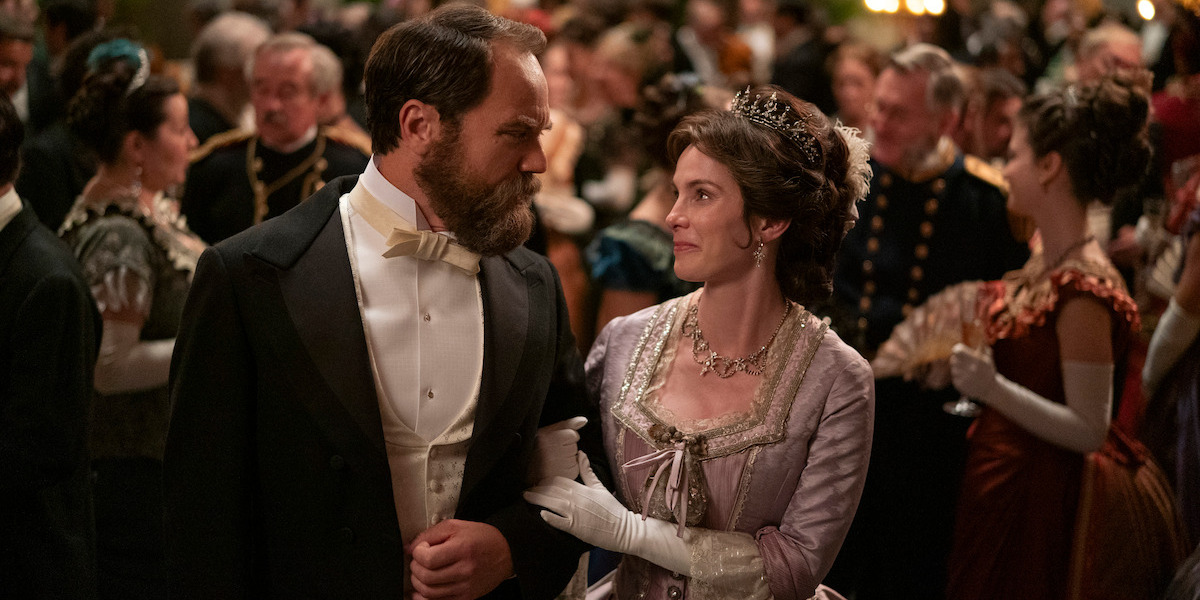
Soon enough, on July 2, 1881, as Garfield arrives at the train station to leave Washington, Guiteau waits for him and shot him twice. The former, a stern believer that assassinations weren’t very common and that one couldn’t prepare for them in any case, was entirely unguarded. The first bullet, shot from behind, grazes the President’s arm, but the second gets him in the chest. In the immediate aftermath, one of the bystanders, Dr. Charles Purvis, offers his help. Nonetheless, soon enough, Dr. Bliss takes over as the Head Physician, tasked with the bullet’s retrieval. Notably, the latter is so focused on his single-minded mission to get the bullet, he pays little attention to the hurt his probing causes the President. When Purvis attempts to point this out, alongside the potential risk of his unsanitized equipment, Bliss rebuffs him as a result of his ego and bigoted prejudice against the African-American doctor.
Weeks pass, and Garfield remains alive, even as he’s barely holding on. Bliss remains unable to retrieve the bullet but is equally insistent that he can get the job done. The President’s condition worsens with every day, and the physician’s contribution proves to be more of a hindrance than anything. A month later, his wife takes him to Monmouth, hoping the change of scenery would do some good for his soul. In the end, Garfield dies, spending his last days with his wife. The worst of it comes on the heels of his death when an autopsy reveals the horrid fact that his life could have very easily been saved. For one, the bullet wasn’t near his spine as Bliss had insisted. Instead, it was near his liver, dodging all essential organs. This means the bullet was no actual threat to the President’s life, and he could’ve survived if it had been left alone. Instead, it was sepsis that killed Garfield. The infection was a result of Bliss’ refusal to take sterilization seriously as he repeatedly operated on his patient’s weakening body.
What Happens to Guiteau? Does He Publish His Book?
Guiteau’s story remains an intriguing one from the beginning. He is introduced into the tale as a criminal who is considered to be “a drain on society.” Nevertheless, he’s quick to defend his worth with a grand speech about American values, which seems to ultimately get him out of trouble. For a minute, it’s almost plausible to believe he’s an intelligent, if misunderstood, young man. However, his unstable condition soon becomes evident. Guiteau is prone to delusions of grandeur that compel him to lie, cheat, and deceive. Worst of all, he seems to believe his wrongdoings are justified in the grand scheme of things. Furthermore, once he lies long enough, it becomes hard to tell if he himself has fallen for his tall tales or not. His infatuation with Garfield begins on the day of the Republican Presidential Nominee ballot.
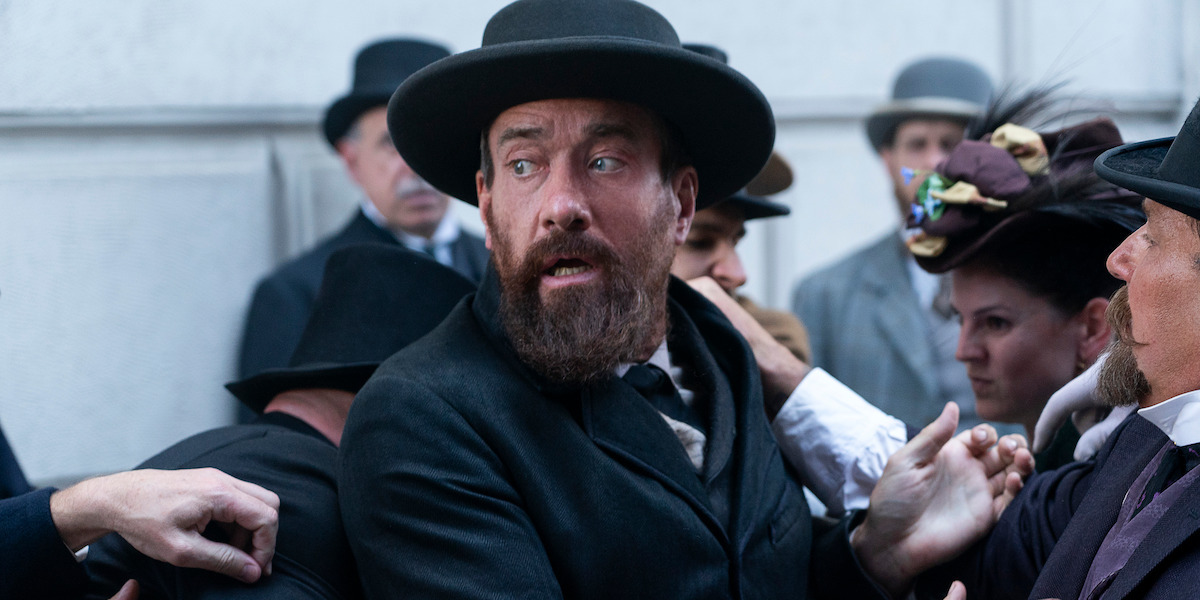
Shortly after learning about his nomination, Guiteau joins the crowd outside the Republican National Convention building, celebrating Garfield’s win and even managing to snag a handshake. From there, he makes the decision to join politics and begins hounding the Senators associated with Garfield’s campaign. Initially, it seems like simple opportunity-seeking, done with a falsified portfolio and work experience. He seems to believe his simple faith in the Presidential candidate is enough to mandate him a spot on the Republican campaign party. This only grows further once the candidate actually wins the election. Now, Guiteau seems to have convinced himself that his attempts at being of use to the campaign were as good as being an active contributor to it. For the same reason, he feels he’s owed compensation in the form of a consulship.
All of this culminates in a bigger fantasy where Guiteau becomes convinced that Garfield has somehow wronged him by discarding him. In this transitional period, he convinces himself that the President, whose term hasn’t even been completed for three months, is single-handedly responsible for everything that is wrong with the country. Therefore, in his head, the only solution that remains is Garfield’s removal from office, followed by his Vice President, Arthur’s ascension. Therefore, by the time he actually commits the murder, he has convinced himself he’s committing an act of heroism. Even when this lands him in prison, he believes he has the people’s favor, mistaking angry mobs for fanatic protestors. He even has plans to write a book about his life, convinced that people would be fascinated by and indebted to him. Needless to say, that book never became a reality. Yet, all that waits for him at the end of the line is the hangman’s noose. On the day of his trip to the gallows, a depressing group of witnesses awaits him. It’s only when the noose is actually tied around his neck that he realizes the reality of his situation. However, by then it’s already too late.
Does Chester Arthur Become the President? Does He Resign?
Chester Arthur’s relationship with Garfield remains a tumultuous one. Even though he’s the latter’s Vice President, the two have no politics in common. One of the prime reasons behind the latter’s nomination as the Republican candidate stems from the party’s reluctance to entertain Grant’s re-election. Under Grant’s leadership, 75% of the federal revenue was passing through the Ports of New York. This gave the Collector of the Port of New York, Arthur, immense power, influence, and wealth. His success was directly tied to Conkling, the real puppeteer, who was eager to have so much financial control over the country. Therefore, when his candidate, who is sure to maintain the status quo, loses to a reformer, the Republicans run the risk of losing New York votes in the upcoming election.

For the same reason, Blaine pitches the idea of making Arthur the Vice President in a ploy to secure New York votes. However, this ends up backfiring on Garfield, who is stuck with a mole once he actually becomes President. Thanks to his help, Conkling is able to run a crusade against the President. Arthur even goes as far as to badmouth the latter in the Press flagrantly. Nonetheless, everything changes after the assassination. Initially, Guiteau insists that he’s friends with the Vice President, implicating him in the political assassination. However, despite everything, Arthur never wanted Garfield to lose his life. In fact, the President’s refusal to lose his faith in the VP despite constant betrayals softened the latter up to him.
Eventually, Conkling’s own politics become the nail in the coffin that cements Arthur’s shifting allegiance. In the wake of Garfield’s assassination, the former Senator only seems concerned with banking on the opportunity to reclaim his spot in the Senate and restart his political career. He has not only accepted that the President will die, but he’s actively praying for it. This opens Arthur’s eyes to the kind of cynicism and corruption he has surrounded himself with. For the longest time, he believed fighting the machine was a lost cause. However, he now realizes that if nothing else, he at least no longer wants to be an active contributor to the Conkling’s machine. Afterward, a tough conversation with Crete makes him realize that he would only be dishonoring Garfield’s memory by taking the coward’s way out and resigning. Therefore, he decides to step up and accept the Presidency, dedicating his term to carrying his predecessor’s legacy and fighting corruption.
What Happens to James Blaine? Does He Become the Republican Nominee?
Unlike Chester Arthur, James Blaine’s political career proves to be a lot more unstable. From the start, his character was interested in bringing down Conkling and his Stalwart ways so that the federal revenue, being eaten up by New York, could be freed up for other purposes. He’s passionate about the reform, which compels him to pledge his allegiance to Garfield during the nominee ballots. Still, the fight doesn’t end with the latter’s election as the President. During the first month, Conkling consistently tries to undermine Garfield by preventing him from creating his cabinet. He achieves this by intimidating and blackmailing congressmen into distancing themselves from Garfield. Nonetheless, Conkling’s demise comes sooner than later. In an effort to further agitate Garfield, the Senator hands in his resignation from the Senate. Moreover, he convinces Tom Platt to make the move with him for added effect.
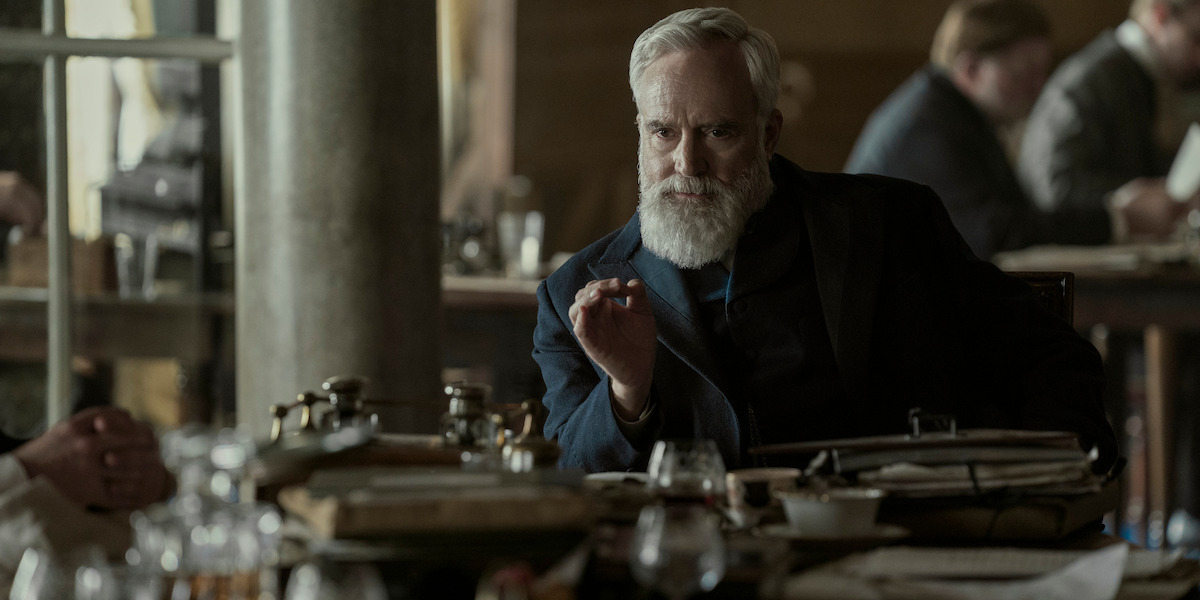
Conkling is sure that this would lead to an instability between Republican and Democratic ratios that would inevitably force the Senate to re-elect the duo, only further cementing their reputation. However, on the day of the vote, something unexpected happens. As it turns out, Platt has some sexual desires of an eccentric nature. Therefore, the recent discovery of his time with a dominatrix compels him to become a joke among his peers. Conkling takes this as a threat, convinced no one would ever be able to take Platt seriously after the scandal. For the same reason, he urges Arthur to take him off the roster. Funnily enough, hours later, he realizes his own affair with a governor’s wife is also the talk of the town. Thus, he loses his election, opening up the spot for Garfield and Blaine to push their own preferred Senators. While this is good for the latter’s career in the moment, it also means that in the upcoming Presidential election, he’s the best nominee that the Republican party has. Ultimately, Blaine simply doesn’t have the pull to win a national election, which leads to the party’s loss, breaking a 24-year streak.
Why Did Crete Visit Guiteau In Prison Before His Death?
One of the more peculiar parts of the series’ ending arrives after Garfield’s death, in the lead-up to Guiteau’s hanging. The night before he’s set to meet his demise, the prisoner receives an odd visitor: Crete, the President’s widow. However, the latter isn’t at the prison to provide her husband’s killer with any consolation or forgiveness. Instead, she’s eager to aggravate his doomed fate further. Garfield’s premature death stole the man away from his family. Yet, it also stole him away from a legacy that could have been great. The Ohioan never wanted the Presidency and was instead satisfied to live his life in the countryside with his family. Nonetheless, once presented with the responsibility, he was dedicated to his constituents, sacrificing his domestic dreams for a fight against corruption.

Nonetheless, Guiteau ensures Garfield fails to make any real change by killing him three months into his Presidency, most of which was spent solving a Partisan feud. Therefore, even Crete knows that despite her husband’s potential for greatness, he would never be remembered for the same. In fact, she expects history to forget about him quite easily. Thus, she wants to make sure that the same happens to his killer. During her visit, Crete tells Guiteau that she has made sure his treasured book, “The Truth,” never gets published. Without a president’s portrait to remember him, the assassin would be forever forgotten by the pages of history. Ultimately, this proves to be the greatest punishment for the opportunity seeker.
Read More: Hedda Ending Explained: What Does Hedda’s Smile Signify?

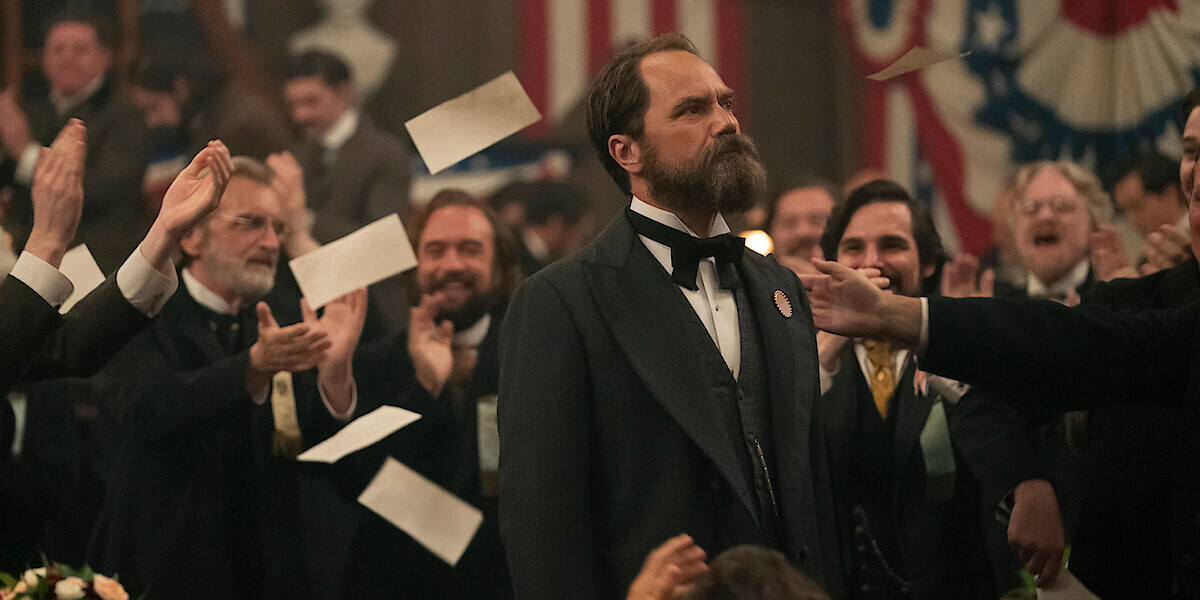
You must be logged in to post a comment.